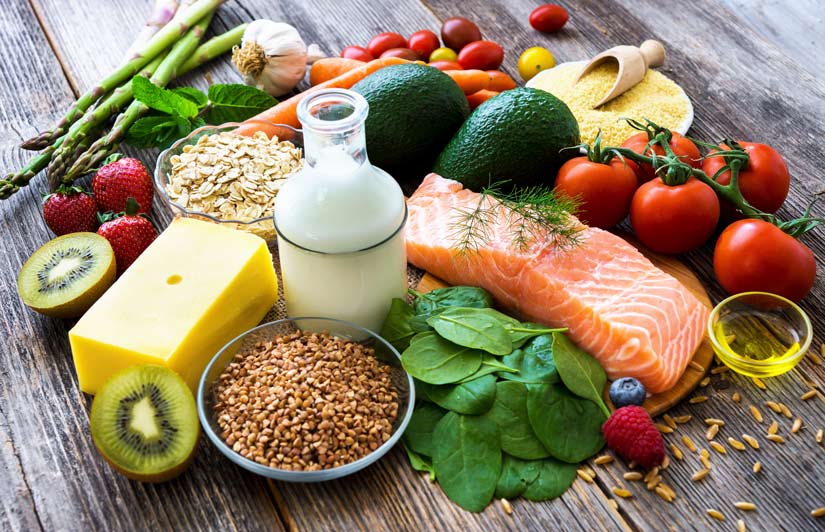Nutrition’s Role in Overall Health
Good nutritional choices are seldom a priority for someone wrestling with a substance abuse disorder such as opioid or alcohol addiction. But once the journey toward lasting sobriety has begun, nutrition can play a key role in helping to limit the risk of relapse and in reversing some of the damage that has been done to a person’s health.
That said, turning one’s diet around is not always easy. In fact, people in recovery often report that they find themselves craving sugar and caffeine—both of which can mimic (to some degree) the rush of drug use. Feeling that sugar or caffeine high can quickly become a slippery slope leading directly to relapse.
The dangers of relapse aside, it probably goes without saying that sugar and caffeine do not provide a firm foundation on which to build a healthy eating regimen. The swings in blood sugar associated with high levels of sugar consumption alone can be problematic. So what should you be eating and drinking?
Colorful is Key
Think of the rainbow of colors represented by all the fruits and vegetables on offer in the produce section of your local grocery store or at an area farmer’s market. From apples to zucchini, the options are nearly endless—as are the options for preparation. But you don’t have to get complicated. Eating raw whole fruits and raw or steamed vegetables is a great way to support your nutritional goals.
It Should Be Easy Eating Greens
Though green is, obviously, a color, it is important to give leafy greens—like kale, arugula, spinach, and all the lettuces you can think of (except, perhaps, for iceberg lettuce, which is primarily composed of water)—their own category. Leafy greens are full of vitamins and minerals that support overall health.
Lean Into Lean Protein
Red meat can be part of a healthy diet, but lean proteins like chicken, turkey, or fish might be a better focus for day-to-day eating. Protein can be found in beans and nuts, too. Just be sure those nuts aren’t too high in salt or saturated fat from being prepared in oil.
Don’t Forget the Fat
We’re conditioned to associate the word “fat” with negative ideas. But the fact is, good fat—like that found in eggs, fish, avocados, some cheeses and nuts, and deliciously decadent dark chocolate—is extremely important. We need this good fat to bind with a variety of nutrients and to provide omega fatty acids that help the body repair damaged tissue. You will find the good fat in whole foods—and you will often find the fats you want to avoid in processed food.
It’s Simple: You Want Complex Carbohydrates and Whole Grains
Swap out the white rice and skinless potatoes for brown rice or quinoa. Still craving the potatoes? No problem. Choose dark-skinned potatoes and be sure to eat that skin, which is where all the nutrients can be found. Use whole wheat flour instead of white and consider whole wheat pasta in place of the usual fare. Complex carbohydrates—like starches and unrefined sugars–provide natural energy and have much more nutritional value than simple carbohydrates like refined sugar.
Wet Your Whistle With Water
Stay away from added sugar and high levels of caffeine by sticking to water and white, green, or herbal teas. You want to stay hydrated, and water is far and away the best beverage to achieve that goal.
Adventuresome and Intentional Eating
Maybe you are having a hard time breaking out of your usual eating cycle. Processed food is often quick, easy, and inexpensive. So how do you motivate yourself to make better choices?
One option might be to become more adventuresome with your food choices. Maybe you’d like to try foods from different parts of the world. Perhaps you would like to replace some of your meat consumption with plant-based options. Maybe you just need to try a friend’s favorite recipe or restaurant to open yourself up to new and engaging options. If eating is an adventure instead of just a chore or a quick route to a sugar rush, you might find yourself enjoying it more and making healthier choices over time.
A food journal can help you track your progress. Whether kept in a notebook or a fitness app, a food journal can remind you what you’re choosing to consume and in what amounts. A gentle reminder that you’ve already had a candy bar and should therefore perhaps avoid the ice cream sundae after dinner can be helpful and motivating. It’s also a great way to keep track of your water intake and to keep an eye on your caffeine consumption.
It’s Okay to Treat Yourself Sometimes
And a little personal forgiveness goes a long way, too. Did you eat something delicious with little to no nutritional value? It’s fine to treat yourself now and then. The goal here is to make sure the treats don’t make up the majority of what you eat and drink.
Of course, diet is just part of a wellness-focused lifestyle, but it is an essential one. When you eat better, you feel better. And when you feel better, you are less likely to succumb to temptation. Maintain your sobriety one healthy bite or sip at a time.
At Bel Aire Recovery Center in Kansas, we understand the importance of nutrition to your recovery. We have the resources and knowledge to get you started in a good direction—with food and beverage options and ideas that will support rather than undermine your sobriety journey.




